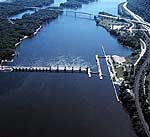By Mary Losure
Minnesota Public Radio
March 20, 2002
Interest groups with vastly different visions of the future of the Mississippi River turned out Tuesday night for a public meeting held by the U.S. Army Corps of Engineers. The Corps presented its latest version of a study on whether to expand the lock and dam system on the upper Mississippi.
| |
|
|
|
||
For nearly a decade, the Army Corps of Engineers has been studying the costs and benefits of building longer locks on the upper Mississippi, but the study was suspended in a cloud of scandal. Two years ago, a whistle-blower charged that top Corps officials had skewed the study in favor of construction.
Agency officials say the new, restructured study will give a much higher priority to environmental concerns, instead of focusing simply on how to relieve barge congestion.
Environmentalists at the meeting said they welcomed the Corps' change of direction.
"Whatever we do with the navigation study, it is imperative that we determine the costs of environmental mitigation and restoration before we enter into the project," said Tim Sullivan, executive director of the Mississippi River Basin Alliance, "So we don't once again pass on the burdens and the costs to our children, and our children's children."
Environmental groups want to see the Corps spend more money on projects like restoring Mississippi backwaters. Those backwaters are a critical habitat for migrating birds and many other species of wildlife.
|
"It is imperative that we determine the costs of environmental mitigation and restoration before we enter into the project."
- Tim Sullivan, Mississippi River Basin Alliance |
They also argue that barge traffic on the Mississippi has been far below the Corps projections. They point out that today, more grain is being used in the Midwest for ethanol and other local uses, and that's reduced the amount of grain sent down the Mississippi to export markets.
But barge company representatives said the lock expansions are critical to the future of river transportation. Heavy industry and farm group representatives also testified in support of the lock expansion.
"Our locks are aging past the designed term of use," said Bob Kruger, a soybean farmer from Hayfield in southern Minnesota. "Economists are warning there will be a loss of efficiency to farmers and businesses if improvements aren't made to the river system. Farmers who depend on the river stand to lose at least 20 cents per bushel due to delays and congestion on the river," he said.
Supporters of the lock expansions said they are long overdue. Paul Rohde, vice president of Marc 2000, a group representing barge companies and other river transportation interests, says some locks need to be increased in size.
|
"(The locks are) over 60 years old and have outlived their intended life span...they are too small. "
- Paul Rohde, Marc 2000 |
Rohde says they'd like to see five locks on the Mississippi and two on the Illinois doubled in length, from 600 feet to 1,200 feet.
"They're over 60 years old and have outlived their intended life span, and that needs to be addressed," says Rohde. "Not only the fact that they are too small, but they are experiencing more and more delays due to the amount of breakdowns and repairs that are needed."
Rohde says the project would cost about $1.2 billion. He says half would be paid by the barge industry, and half by taxpayers. But taxpayer groups say the Corps has failed to show the project's benefits will outweigh its costs.
The Corps will present an interim study to Congress this July, but it will not contain a cost-benefit analysis, or a recommendation on whether the expansion should go forward.
Marc 2000's Paul Rhode says the group hopes Congress will go ahead anyway, and approve the lock expansion this fall.
A final report from the Corps, which will include a cost benefit analysis and recommendation, is not expected until 2004.
More from MPRMore Information

